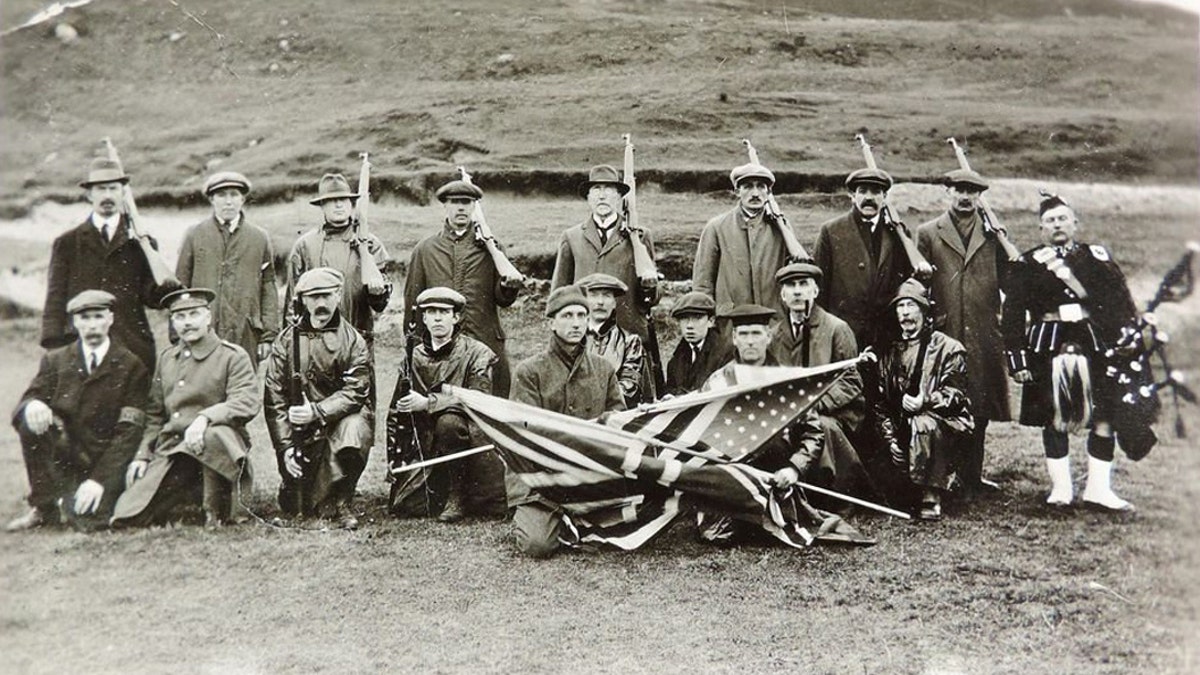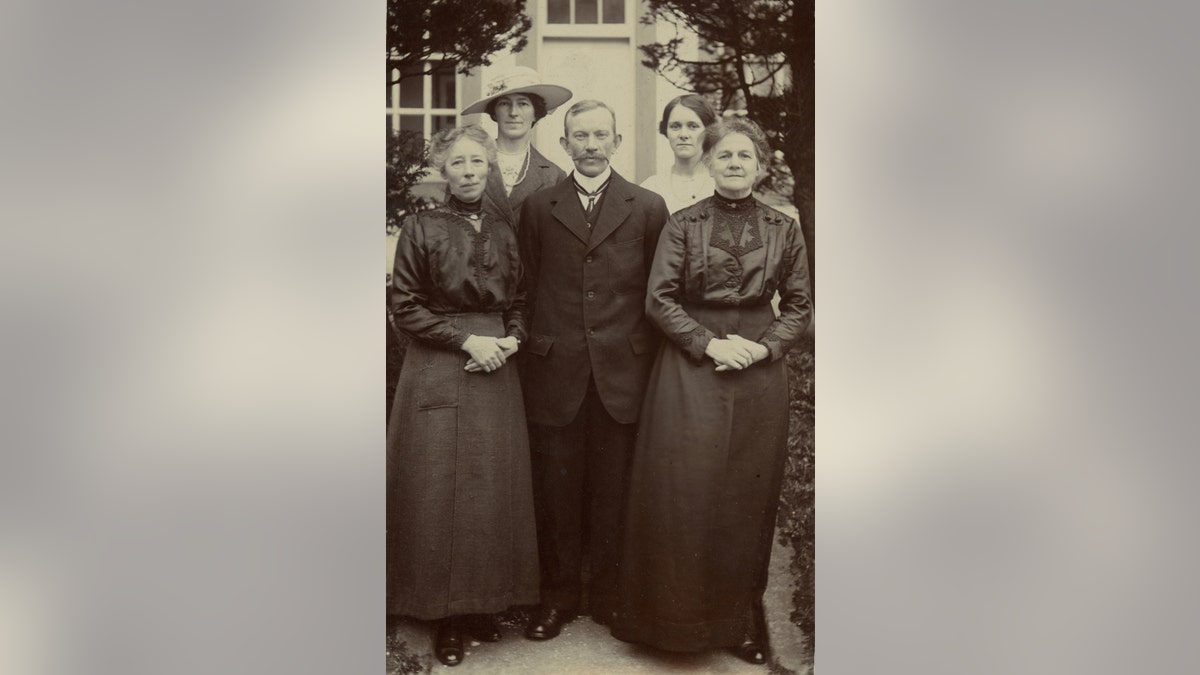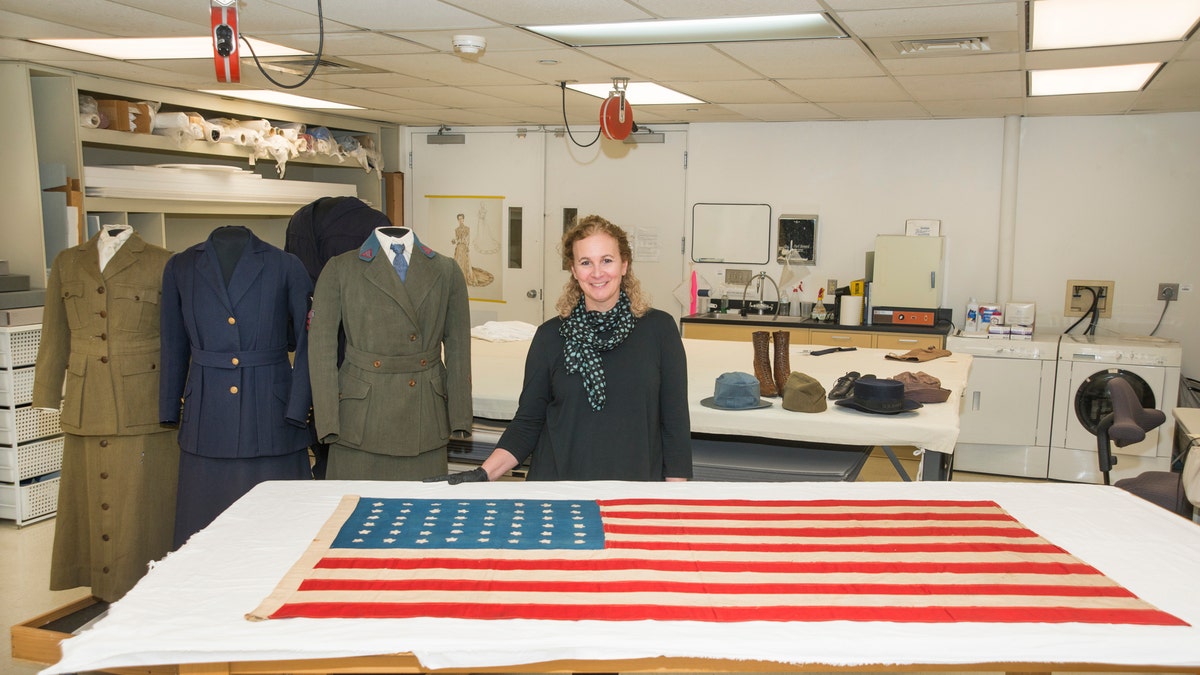100-year-old US flag made for WWI soldiers returns home
A 100-year-old flag used in the funeral of U.S. troops on a small Scottish island during World War I is making it back to where it originated from as part of a remembrance of the Great War.
A 100-year-old flag used in the funeral of U.S. troops on a small Scottish island during World War I is making it back to where it originated from as part of a remembrance of the Great War.
Currently held in the Smithsonian’s National Museum of American History in Washington D.C., the flag is making a trek back across the Atlantic to where it was put together, the Scottish island of Islay. It was used in funerals for the more than 200 American soldiers who drowned when the SS Tuscania was hit with a torpedo by a German U-boat.

A traditional funeral was held on Islay for the men killed when the Tuscania was hit by a German torpedo 7 miles off the Scottish Island. The funeral procession was led by the British Union flag and the handmade American Stars and Stripes. See Centre Press story CPFLAG; A flag hand stitched on a Scottish island for a mass burial of American soldiers during World War I is making the 3,500-mile journey back to the island 100 years on. The stars and stripes were sewn in less than a day after the troopship SS Tuscania was struck by a German U-Boat around seven miles from Islay. (© Archibald Cameron / Museum of Islay Life / SWNS.co)
The ship departed Hoboken, N.J. on Jan. 24 1918, with 384 crewmen and more than 2,000 U.S. Army personnel and was headed for Liverpool. The German U-boat, UB-77, eventually sank the Tuscania on Feb. 5, 1918 when it fired two torpedoes at the ship, causing it to sink in about four hours.
MUSEUM SHOCKED TO DISCOVER GIANT EGG IN COLLECTION IS REAL
The flag was put together by five people, according to a letter by Hugh Morrison, the Laird of Islay Estate to President Woodrow Wilson. Jessie McLellann, Mary Cunningham, Catherine McGregor, Mary Armour and John McDougall spent hours sewing the stars and stripes, just a few hours ahead of the first funeral for the deceased soldiers, according to The National, a Scottish newspaper.

The Islay âStars and Stripesâ flag sewn together by Islay residents (left to right) Catherine McGregor, Jessie McLellan, John McDougall, Mary Cunningham and Mary Armour. See Centre Press story CPFLAG; A flag hand stitched on a Scottish island for a mass burial of American soldiers during World War I is making the 3,500-mile journey back to the island 100 years on. The stars and stripes were sewn in less than a day after the troopship SS Tuscania was struck by a German U-Boat around seven miles from Islay. (© National Museum of American History / SWNS.com)
The group of sewers used an encyclopedia to put together the flag, using it for the design and to help with dimensions. In the letter, Morrison said an American survivor carried the flag. “I remember how anxious everybody in Islay was to show every possible honor to the soldiers of the United States who had come over to fight for the cause of the Allies in the Great War," he wrote.
The flag will be a part of the WW100 Scotland National Day of Remembrance on May 4, with dignitaries from around the world taking part of the commemoration. It will be on display at the Museum of Islay Life in Port Charlotte for several months and then make its way back to Washington.
Jenni Minto, of the Museum of Islay Life, said she is happy the flag is back home for the memorial service. "Islay and Jura lost over 200 of their own men in WW1 and sadly those families never got the opportunity to bury their own," Minto said, according to SWNS.
INCREDIBLE REVOLUTIONARY WAR JOURNAL SURFACES, DETAILING POW'S ESCAPE FROM BRITISH SHIP
She added: "The sinking of the TUSCANIA and later the OTRANTO, gave the islanders the opportunity to look after those men, living and dead, as they hoped their own boys would be cared for at land and sea. The making of the flag 100 years ago is symbolic of that and I am delighted that it is to come home to Islay as part of our commemorations."

Curator Jennifer Jones with WWI Islay Flag in the Conservation Lab at the Nationl Museum of American History, Washington DC. See Centre Press story CPFLAG; A flag hand stitched on a Scottish island for a mass burial of American soldiers during World War I is making the 3,500-mile journey back to the island 100 years on. The stars and stripes were sewn in less than a day after the troopship SS Tuscania was struck by a German U-Boat around seven miles from Islay. (© Richard W. Strauss/National Museum of American History /SWNS.com)
Richard Kurin, the Smithsonian's ambassador-at-large said the museum is " proud to have been its stewards” and it "embodies an amazing story."
“We are prouder still that the flag now returns home to be exhibited on Islay where it can invoke in the current generation an appreciation of how their forbearers so respected those brothers in battle who’d washed up upon their shores, offering hospitality and healing to the survivors, and providing a last measure of honor to the fallen soldiers and crew," he added.
A previous version of this article said the Tuscania sank on Feb. 5, 2018. Fox News regrets this error.









































